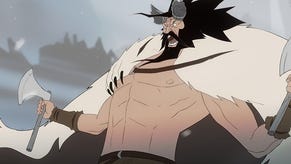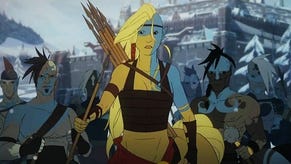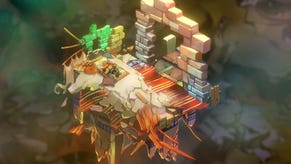The Banner Saga marches to launch: Stoic talks style, stats and strategy
Tactical RPG The Banner Saga will launch on January 14, over a year after it was funded on Kickstarter. VG247's Dave Cook talks with ex-BioWare developer Alex Thomas to discover why this could be the biggest release of his career.
”I think for most game designers or developers everybody has that idea in their hip-pocket that they want to do some day, and it just happened the timing was right. We decided if we didn’t do it now, we probably never would.”
The Banner Saga was successfully funded on April 21, 2012, after 20,042 backers amassed a staggering $723,886 for the cause. Based in Austin, Texas, developer Stoic only consists of three people, but there's one thing former BioWare colleagues Alex Thomas, Arnie Jorgensen and John Watson all have in common, and that's a deep, practical understanding of what makes role-playing strategy work.
I spoke with Thomas over Skype recently and he professed to have played just about every turn-based strategy RPG he could lay his hands on, and comes bearing a profound love for a little game called Final Fantasy Tactics. It proved instrumental in his burning desire for the genre, and convinced him to make a career out of stats, turns, perma-death and moral choices. He previously worked on Star Wars: The Old Republic for around five years at BioWare Austin, and during that time he started to get the indie itch. With The Banner Saga's base concept in mind, he and his fellow coders flew the coop and founded Stoic.
We're now just weeks from the game's launch on PC and Mac. It's a turn-based RPG down to its bones, with many playable classes, comrades with complex back-stories, and the risk of perma-death that is guaranteed to make you very upset. There's also morality, a multiplayer offering in the form of The Banner Saga: Factions, and a captivating art style reminiscent of Don Bluth's Secret of Nimh, or his own videogames Dragon's Lair and Space Ace. At a time where titles like Fire Emblem: Awakening and XCOM: Enemy Unknown are turning heads, Stoic's release couldn't be more relevant.
"We had planned to start our own company before Kickstarter became a big thing," Thomas told me. "Largely it was because the three of us were working together at BioWare, we knew each other, we knew that he timing was just right for us to set out and do something on our own. I think for most game designers or developers everybody has that idea in their hip-pocket that they want to do some day, and it just happened the timing was right. We decided if we didn't do it now, we probably never would, so we had to go and start our own thing. That's actually becoming more and more common I think. You're starting to see little 'triple-a' indies popping up all over the place."
”The biggest take-away from that is, we found that we had created a system where every single point in a stat, every single ability mattered phenomenally. We kind of fudged numbers around and everything came down to single digits in terms of winning or losing.”
He explained that prior to leaving BioWare, the Stoic trio had The Banner Saga's loose concept in place, and they felt so strongly about the idea, that it formed the basis of the whole company. Given Thomas, Jorgensen and Watson's pedigree, there was no question that crafting a turn-based RPG was the correct way to go. For Thomas specifically, his self-professed area of expertise from his time at BioWare is branching stories. He called them "deceptively difficult," and it certainly serves as a key driver of The Banner Saga's episodic progression.
Being a 'student' of the genre, Thomas knows the big dos and don't of the strategy RPG genre, and he forewarned me that it's a notoriously strenuous genre by design. This is abundantly clear to all and sundry, but I wanted to know in practical development terms just how much effort has gone into making sure The Banner Saga's skirmishes play out fluidly and how to ensure that every hint of character progression makes a profound impact in the field. Thomas told me that his education on all things turn-based started with the original XCOM and simply, snowballed from there.
"I think I understand what makes it fun," he mused, "but on the other hand we kind of went with the more dangerous route, in which we said we wanted to make something that felt original. So we didn't take an existing game and build off of that, which is an iterative process which is fairly common in game development, because it's a lot safer. We decided to make a unique turn-based system with game mechanics that people hadn't really seen before. Part of proofing that out was what we did with The Banner Saga: Factions, which was our free multiplayer.
"The biggest take-away from that is, we found that we had created a system where every single point in a stat, every single ability mattered phenomenally. We kind of fudged numbers around and everything came down to single digits in terms of winning or losing, and that absolutely helped us refine the combat system. We also added a lot of features based on that, and it seemed if the balance was swinging one way or another we were able to adjust for it. I think what a lot of people were telling us was that it was one of the best-balanced strategy games out there."
”The nice thing about our game, as in many turn-based strategy games like Fire Emblem: Awakening is, with a huge ensemble cast you can keep introducing new characters. For example, the second game is going to have enough new characters that I think it’ll feel distinctly different from the first.”
Thomas stressed that when Stoic went into the project the trio thought they were making a fun, almost casual take on the genre, but almost immediately realised just how hardcore people were taking it. The project simply grew deeper from that point and by being independent, the team could take as much time as it needed to make sure the underlying mechanics functions in a way that made sense. We're now essentially a month from launch, and the team has entered a phase of eleventh-hour polish and quality-checking. To see a small team making a game of this size off its own back, and with the help of the public, is nothing short of inspired.
The game was delayed by about a year as it grew more ambitious, and Thomas conceded that he initial date was both "naive and ridiculous" on Stoic's part, but for the team's first release, it has certainly shown that the additional time has paid dividends. That said, Thomas added that if he could go back and change one thing about the Kickstarter campaign, it would be that initial launch date. I asked him what his plan was for The Banner Saga's second and third episodes, and when development would begin.
"We have some stretch goals from the Kickstarter that are based on the multiplayer," he replied. "So for the multiplayer we mentioned city-building and that's something we want to implement before we start working on the second game. But then I think we're going to pay some attention to Factions for a couple of months, then we'll be back to focus on the next game in the series. We're looking at it like a trilogy like Lord of the Rings, so within each game you have a single start-to-finish arc that should be pretty satisfying. And then within the larger picture of what's happening in the world, you have a three-part trilogy.
"The nice thing about our game, as in many turn-based strategy games like Fire Emblem: Awakening is, with a huge ensemble cast you can keep introducing new characters. For example, the second game is going to have enough new characters that I think it'll feel distinctly different from the first, and will both have their own unique stories." Once again, I need to add-in the threat of perma-death. With each character having deep stories and personalities - instead of a randomly rolled avatar - the threat of losing your favourite cast member is all the more poignant.
I couldn't conduct my interview without asking Thomas about the game's whimsical art style which, again, mirrors the work of Don Bluth and the early years of Disney's motion picture filmography. Would this art style result in a harder sell for the Banner Saga, had Stoic sought the aid of a publisher over Kickstarter? "Probably a harder sell," he replied, "although it's hard to say. We didn't go to any publishers so we're not sure if it would have been rejected outright or not, but it was definitely liberating to make a decision like the art style where, I think, at BioWare or wherever, we had gone and said, 'we want to an art style based on Eyvind Earle from Sleeping Beauty,' I don't think too many people would have jumped on that.
"We wanted something that would separate us. There's lots of very 'World of Warcraft'-looking, cartoony games, and we thought this art style matched more with the mature theme we wanted to go for. So one of the key selling points has been how much everybody loves the art style and what's interesting when you said it reminded you of Don Bluth is, depending on where a person is from, they always tell us it reminds them of something different, which I think is always interesting."
Development of The Banner Saga has clearly been a labour of love for Stoic and a steep learning curve in flying solo. If this is the end result, then it shows that the team clearly has the skills and adaptability needed to make an intriguing, deep and attractive title in what is an increasingly malleable industry. You've probably heard this a hundred times already but we really are in the middle of a golden age, in which smart, creative people can turn their dream pitches into a reality.
Would this game and its peers have been made under stringent publisher rule. It's hard to see, but Thomas stressed that if The Banner Saga Kickstarter had failed, Stoic would have made it regardless, but with a strictly pared-back running time and lesser production values. Thanks to Kickstarter, this is now a high-quality piece of entertainment, with a dynamic score from Austin Wintory, professional art and sound effects, a solid running time over three episodes, complicated strategy mechanics and much, much more.
If this reality - in which the talent is calling all the shots and creating unbounded pieces of art - is where wallet-voting is taking the industry, then I say let people vote. Thomas concluded in saying that publishers are not evil, an aren't necessarily a negative influence on game development. He stressed that they too are smart, and handle the business of game development and sales exceedingly well. Stoic is lucky to have taken the plunge and come out relatively dry without their help. It has earned its shot at the market through hard graft, a solid concept and immense skill.
We'll see exactly how all of this effort bears fruit come January 14.











